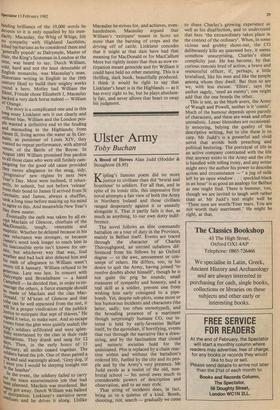Ulster Army
Toby Buchan
Kipling's famous poem did no more justice to civilians than did 'brutal and licentious' to soldiers. For all that, and in spite of its ironic title, this impressive first novel attempts a fair view of both the Army in Northern Ireland and those civilians ranged desperately against it or uneasily alongside it. That it partly fails is due, as much as anything, to our own dotty indif- ference.
The novel follows an elite commando battalion on a tour of duty in the Province, mainly in Belfast itself. Events are traced through the character of Charles Thoroughgood, an untried subaltern dif- ferenced from his fellows by an Oxford degree — to the awe, amusement or con- tempt of others. He differs, too, in his desire to quit the Army, having joined `to resolve doubts about himself, though he is not quite the prig he sounds; small measures of sympathy and honesty, and a real skill as a soldier, prevent one from wishing him early consigned to a pipe- bomb. Yet, despite sub-plots, some more or less humorous incidents and characters (the latter, sadly, too often stereotyped), and the brooding presence of a martinent though surprisingly humane CO, our in- terest is held by early-Seventies Belfast itself, by the quotidian, if horrifying, events that run through the narrative like a draw- string, and by the fascination that closed and esoteric societies hold for the uninitiated. Plot is replaced by a chain reac- tion within and without the battalion's ordered life, fuelled by the city and its peo- ple and by the Army's very presence. Mr Judd excels as a realist of the old, non- brutal school — his novel owes much to considerable powers of description and observation, and to an easy style.
That string of incidents does, in fact, bring us to a quietus of a kind. Bomb, shooting, riot, search — gradually we come
to share Charles's growing experience as well as his disaffection, and to understand that here 'the extraordinary takes place in the context of the ordinary'. When, in some vicious and grubby shoot-out, the CO deliberately kills an unarmed boy, it seems somehow unsurprising, Charles's silent complicity just. He has become, by that curious osmosis bred of action, a brave and resourceful officer, if, perhaps, a little brutalised, like his men and like the people among whom they dwell. But then So are we, with less excuse. 'Elites', says the author sagely, 'need an enemy'; one might add that the one breeds the other.
This is not, as the blurb avers, the Army of Waugh and Powell, neither is it 'comic'. Much of the humour depends upon parody of characters, and these are weak and often unrealistic. Lesser blemishes are occasional- ly annoying, belying the quality of the descriptive writing, but to cite these is to carp. Mr Judd's is a powerful and vivid novel that avoids both preaching and political hectoring. The portrayal of life in an active company contrasted with the life that anyway exists in the Army and the city is handled with telling irony, and any writer might envy the author his power to describe action and circumstance — a jug of milk left by an open window . . . speckled black in an hour' is as good an analogy for Belfast as one might find. There is humour, too, though we are invited to laugh with rather than at. Mr Judd's text might well be 'These men are worth/Your tears. You are not worth their merriment.' He might be right, at that.










































 Previous page
Previous page